Nature Knows and Psionic Success
God provides
To Remember, the Brain Must Actively Forget

Decades of research have focused on how the brain acquires information, resulting in theories that suggest short-term memories are encoded in the brain as patterns of activity among neurons, while long-term memories reflect a change in the connections between neurons. What hasn’t received nearly as much attention from memory researchers is how the brain forgets. “The vast majority of the things that are happening to me in my life — the conscious experience I’m having right now — I’m most likely not going to remember when I’m 80,” said Michael Anderson , a memory researcher at the University of Cambridge, who has been studying forgetting since the 1990s. “How is it that the field of neurobiology has actually never taken forgetting seriously?” “Without forgetting, we would have no memory at all,” said Oliver Hardt , who studies memory and forgetting at McGill University in Montreal. If we remembered everything, he said, we would be completely inefficient because our brains would always be swamped with superfluous memories. “I believe that the brain acts as a promiscuous encoding device,” he said, noting that at night many people can recall even the most mundane events of their day in detail, but then they forget them in the following days or weeks. The reason, he thinks, is that the brain doesn’t know straight away what is important and what isn’t, so it tries to remember as much as possible at first, but gradually forgets most things. “Forgetting serves as a filter,” Hardt said. “It filters out the stuff that the brain deems unimportant.” Experiments in the past few years are finally beginning to make the nature of that filter clearer. Traces of Memories Memory is a complicated subject for many reasons, not the least of which is that all manner of creatures have […]
You don’t need to spend hours at the gym to boost your body and brain — here’s how long your workout should take

Cardio could be the closest thing to a miracle drug that we have, but doing it shouldn’t take a whole day. Instead, the available evidence suggests there’s an ideal window for exercises like cycling, swimming, or brisk walking — and it’s under an hour. All of these moves raise your heart rate and get you moving and sweating in a way that appears to benefit our moods and muscles more than other workouts focused solely on weight-lifting or stretching. Cardio could be the closest thing to a miracle drug that we have, but doing it shouldn’t take a whole day. Instead, the available evidence suggests that committing 30 to 45 minutes daily to exercises like cycling, swimming, or brisk walking is the ideal way to reap the maximum health benefits for your body and brain. These moves raise your heart rate and get you moving and sweating in a way that appears to benefit our moods and muscles more than other workouts focused solely on weight lifting or stretching. To do them correctly, scientists have a few pointers that go beyond simply clocking in at 30 minutes. Why cardio is so key to wellbeing A growing body of research suggests that when we commit to regular workouts that raise our heart rates and get us moving and sweating for a sustained period of time, magical things happen to the body and brain. We think more clearly , feel better overall, and protect our brains against some of the cognitive decline that occurs with age. "Aerobic exercise … has a unique capacity to exhilarate and relax, to provide stimulation and calm, to counter depression and dissipate stress," the authors of an article in the Harvard Medical School blog "Mind and Mood" wrote. In addition to the mental benefits, our muscles […]
Shocking study finds that mobile devices can zap your MEMORY

( Natural News ) When you see teenagers glued to their cell phones while out and about, it’s natural to wonder what this constant use of technology is doing to their health and well-being. Much has been made of the negative effects that heavy social media use can have on young people’s self-esteem, for example, and a new study points to yet another way that cell phones are harming the minds of adolescents. A study that was recently published in the Environmental Health Perspectives journal shows that high levels of exposure to radiofrequency electromagnetic fields, or RF-EMF, can hurt memory performance in the areas of the brain that are exposed when a person talks on their cell phone. This study was a follow-up to a 2015 study that reached a similar conclusion. The new study used twice the sample size of the previous one and updated information on the RF-EMF absorption range of adolescents using different wireless communication devices. Using a cell phone close to the head is considered the most relevant source of exposure to RF-EMF to the brain. The scientists from the Swiss Tropical and Public Health Institute (Swiss TPH) looked at the relationship between RF-EMF exposure from wireless communication devices and the memory performance in around 700 adolescents aged 12 to 17. The study entailed filling out a questionnaire assessing their usage of mobile phones and media, along with their physical and psychological health. Afterward, they carried out computerized cognitive tests. The researchers also used cell phone user data provided by phone operators, smartphone time activity apps that were used while the phones were set to flight mode, and portable measurement devices known as exposimeters with integrated GPS to link people’s RF-EMF records to specific activities and places. Mother Nature’s micronutrient secret : Organic Broccoli Sprout […]
The unique complex of protein and fats found in human breast milk KILLS over 40 types of cancer

( Natural News ) Conventional cancer treatments like chemo and radiation therapy are known for causing an array of undesirable health effects. Even so, the cancer industry continues to parade their flagship products as the end-all be-all of cancer treatment. But many people believe that medicine shouldn’t hurt. Perhaps that’s why scientists continue to look for other, less damaging options. Research continues to point to an array of herbs and plants as a means of natural cancer treatment, but the latest science has identified a surprising source of cancer-killing compounds: Human breast milk. Mother’s milk is known for containing a bevy of antibodies and other beneficial compounds for newborn babies, to protect them from all the harmful things in the world while their immune system matures. So in a way, as strange as it sounds, the notion that breast milk may hold the key to fighting cancer naturally, really isn’t that surprising at all. Breast milk as a cancer-killer Professor Catharina Svanborg has been paving the road to capitalizing on breast milk’s cancer-fighting abilities out of her lab at Lund University in Sweden. Specifically, the professor has been working on a way to bind a breast milk protein known as alpha-lactalbumin to oleic acid, a fatty acid found in olive oil, nuts and seeds. The cancer-killing combination she’s dubbed HAMLET (an acronym for human alpha-lactalbumin made lethal to tumor cells) has shown great success in laboratory applications, shrinking brain, bladder and colon tumors with ease. Tests involving animal and human cancer cell lines have shown that HAMLET is effective against at least 40 types of cancer. The power of the elements : Discover Colloidal Silver Mouthwash with quality, natural ingredients like Sangre de Drago sap, black walnut hulls, menthol crystals and more. Zero artificial sweeteners, colors or alcohol. Learn […]
Understanding the Basic Facts about Some Common Nootropics
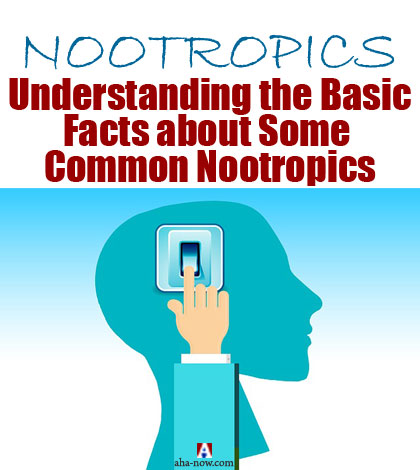
Advertisement Natural Fiber Supplement We have over 80 flavors that you can choose from, so you always have a choice Naturlax If you intake caffeine, then you should know about Nootropics. Otherwise too, Nootropics may prove to be beneficial in many ways. Nootropics are supposed to be helpful in increasing your cognitive or mental functions like focus, intelligence, and memory. But there’s more information that you should read to understand nootropics better. ~ Ed. What are Nootropics ? What good can it do to you? Nootropics are known as brain-boosters. They are also called smart drugs or supplements that enhance the cognitive functions such as intelligence, memory, and focus. Here’s some more information about Nootropics. To start with the discovery of Nootropics, in 1972, CorneliuGiurgea, a Romanian chemist, coined the word Nootropics to describe the compounds that “could turn mind”. Yes, Nootropics gives cognitive benefits to the human brain by enhancing memory and ability to learn. They are virtually non-toxic and possess very few side effects allowing the brain to function under disruptive conditions. Nootropics also help the cortical and sub-cortical regions to improve their neuronal firing mechanism and they even protect the brain from adverse chemical changes. Most of the Nootropics are sold in capsule forms but are also available in powder form in their basic state. Nootropics are not medicines but smart drugs taken by a healthy person. Interested in knowing more about Nootropics? Read on. How does Nootropics Work Our brain has billions of neurons connected by synapses, which communicate and work together with the help of neurotransmitters . An increase in production and signaling of neurotransmitters boosts brain functions (like improved concentration, mood elevation, long-lasting memory and longer attention spans) effectively. The improvement in synaptic plasticity of the neurons due to continued supplementation of nootropics […]
Overnight brain stimulation improves memory
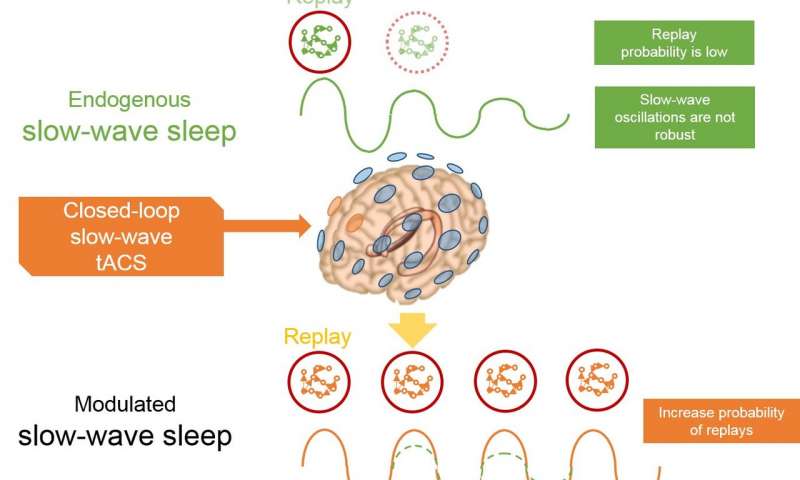
Closed-loop transcranial alternating current stimulation matching the endogenous slow-wave oscillations during sleep boosts offline memory consolidation. Credit: HRL Laboratories New research in humans demonstrates the potential to improve memory with a non-invasive brain stimulation technique delivered during sleep. The results, published in JNeurosci , come from a project funded by the United States Department of Defense that aims to better understand the process of memory consolidation, which could translate into improved memory function in both healthy and patient populations. The transfer of memories from the hippocampus to the neocortex for long-term storage is thought to be enabled by synchronization of these parts of the brain during sleep. Nicholas Ketz, Praveen Pilly, and colleagues at University of New Mexico sought to enhance this natural process of overnight reactivation or neural replay to improve memory with a closed-loop transcranial alternating current stimulation system matching the phase and frequency of ongoing slow-wave oscillations during sleep. Participants were trained and tested on a realistic visual discrimination task in which they had to detect potentially threatening hidden objects and people such as explosive devices and enemy snipers. The researchers found that when participants received stimulation during overnight visits to their sleep laboratory, they showed improved performance in detecting targets in similar but novel situations the next day compared to when they did not receive the stimulation, suggesting an integration of recent experience into a more robust and general memory. Overnight memory changes correlated with stimulation-induced neural changes, which could be used to optimize stimulation in future applications. These findings provide a method for enhancing memory consolidation without disturbing sleep. More information: Nicholas Ketz et al, Closed-loop slow-wave tACS improves sleep dependent long-term memory generalization by modulating endogenous oscillations, The Journal of Neuroscience (2018). DOI: 10.1523/JNEUROSCI.0273-18.2018
Surprising Ways Your Brain Changes After 50

You’re getting older — and you can tell that parts of your body just aren’t what they used to be. You’re feeling more aches and pains than usual, you’re a bit stiffer when you get up in the morning, and memories of years past may be a little fuzzier than expected. The good news is that it’s totally normal for your brain to age just as your body does. But do you know exactly what happens to your brain once you’re over the hump of 50 and beyond ? Here’s what’s really going on, including why you’re forgetting where your keys are more often (No. 10) . 1. Your brain shrinks in size The Real Brain Exhibit at Bristol Science Center | Matt Cardy/Getty Images Sorry, but this one’s unavoidable. TIME notes your brain naturally shrinks in size as you age, though there are also other factors that can cause your brain to reduce in size faster. As for health conditions that can induce this, high blood pressure and diabetes top the list. And lifestyle factors, such as cigarette smoking and having too much body fat, can also cause a decline in brain volume. Brain shrinkage is associated with remembering details, making decisions, planning, organizing, and paying attention — so do all you can to keep your mind healthy. Next: You’ll be surprised that this aspect of your brain actually improves with age. 2. Your ability to make decisions improves Group Of Senior Couples Attending Book Reading Group Group of seniors hanging out together | Bowdenimages/iStock/Getty Images Experience is king when it comes to making moral decisions — so it’s a good thing you gain more life experience as you age. The Independent notes even if your brain goes through some natural wear and tear, you’ll find it easier […]
A very short guide to the most creative part of your brain
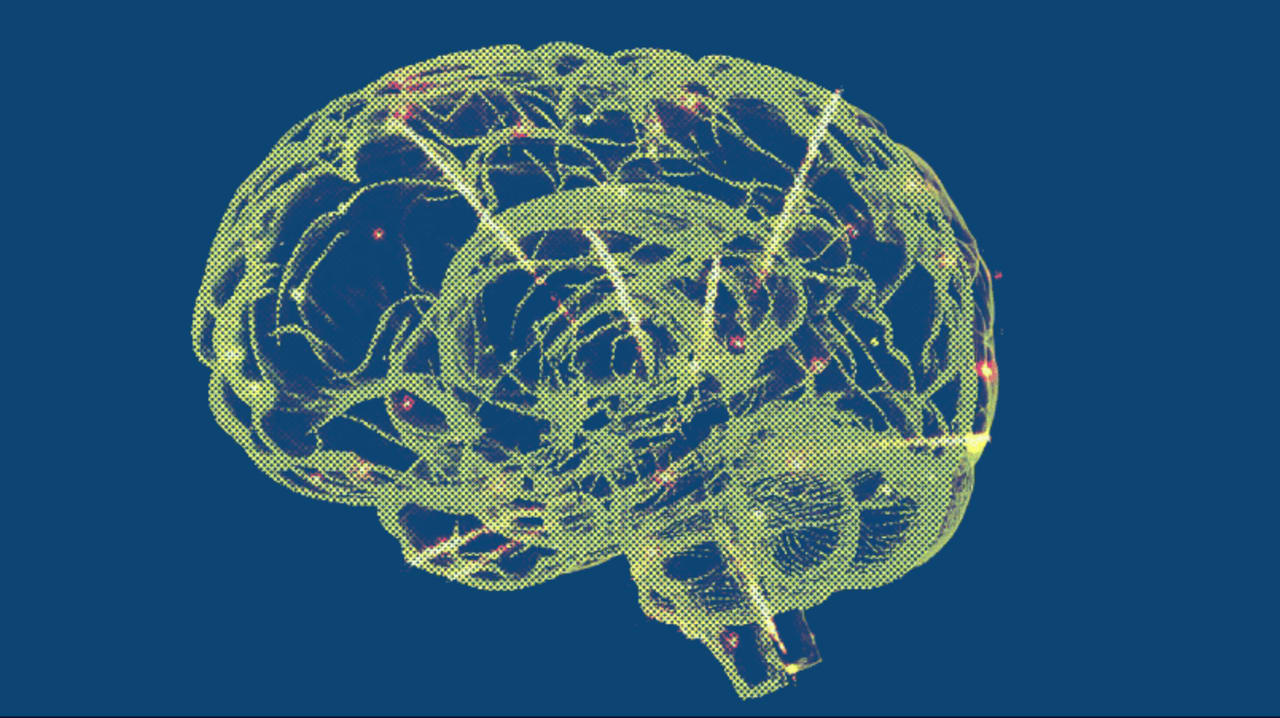
Want to have more “aha!” moments and free up your brain to think more creatively? Of course you do. The key is to tap into your brain’s built-in system for free-association and mind-wandering. But to do that, you need to know how that system operates. So here’s a quick primer. Meet your mind’s “default network” We all have the capacity for creative inspiration simply by being human. It doesn’t matter whether you’re a highly logical or a highly empathetic person (and maybe you’re both!)–there’s still a natural “seesaw” effect at work in your brain. At one end are traits and qualities like being results-driven, focused, and analytical, while at the other are your social and communication skills as well as your empathy. Related: How to be less creative at work (and why you sometimes should) Each end of this spectrum reflects one of two cognitive networks that operate like counterweights in your brain. The task-focused “control network” helps you execute on clear goals, while the “default network” is associated with mind-wandering and spacing out. And it probably won’t surprise you to learn that it’s the default network that’s primarily responsible for creativity. These two networks bookend all the systems and sub-networks in between that together give rise to cognition. When the seesaw is unequally weighted, overall brain agility tends to suffer. The default network is something we’ve recently learned more about. Researchers now know that even while we aren’t engaged in a task or consciously focused on a specific topic, the entire brain remains busy–not just the control network. The default network (sometimes called the “task-negative network”) helps us free-associate and think in abstract terms all the while. This actually makes a lot of sense; a brain that’s functioning with real agility can integrate logic with creativity, intuition, and […]
You don’t need to spend hours at the gym to boost your body and brain — here’s how long your workout should take

Shutterstock Cardio could be the closest thing to a miracle drug that we have, but doing it shouldn’t take a whole day. Instead, the available evidence suggests there’s an ideal window for exercises like cycling, swimming, or brisk walking — and it’s under an hour. All of these moves raise your heart rate and get you moving and sweating in a way that appears to benefit our moods and muscles more than other workouts focused solely on weight-lifting or stretching. Cardio could be the closest thing to a miracle drug that we have, but doing it shouldn’t take a whole day. Instead, the available evidence suggests that committing 30 to 45 minutes daily to exercises like cycling, swimming, or brisk walking is the ideal way to reap the maximum health benefits for your body and brain. These moves raise your heart rate and get you moving and sweating in a way that appears to benefit our moods and muscles more than other workouts focused solely on weight lifting or stretching. To do them correctly, scientists have a few pointers that go beyond simply clocking in at 30 minutes. Why cardio is so key to wellbeing Unsplash / Haley Phelps A growing body of research suggests that when we commit to regular workouts that raise our heart rates and get us moving and sweating for a sustained period of time, magical things happen to the body and brain. We think more clearly , feel better overall, and protect our brains against some of the cognitive decline that occurs with age. "Aerobic exercise … has a unique capacity to exhilarate and relax, to provide stimulation and calm, to counter depression and dissipate stress," the authors of an article in the Harvard Medical School blog "Mind and Mood" wrote. In addition to […]
5 Reasons to Make Matcha Green Tea a Daily Habit in Your 60s
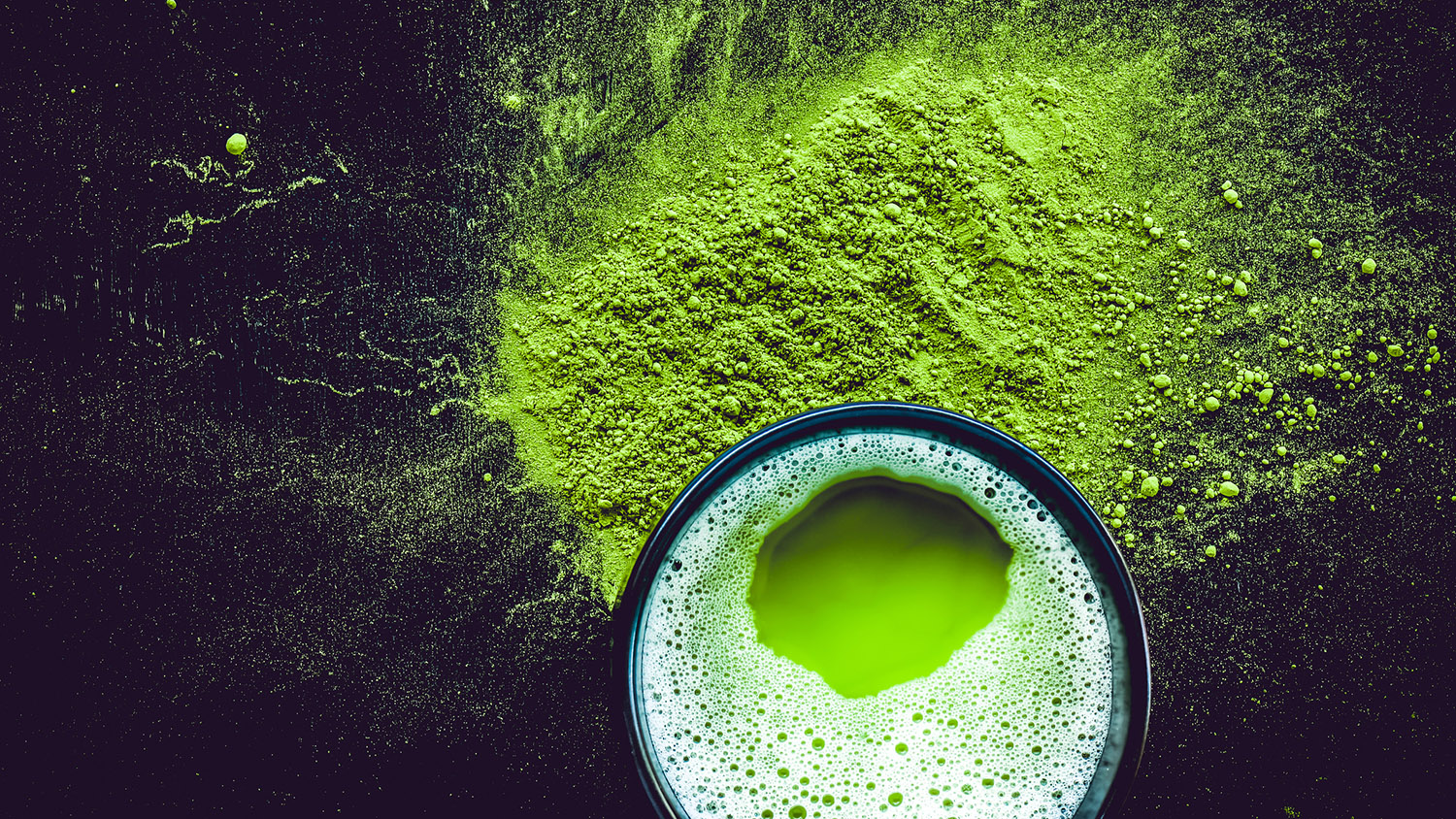
If you’ve been searching for a quick, easy and affordable way to boost your energy, lose some weight and just feel generally healthier, you’re not alone. So many others have tried, failed and continue to look for options online. And guess what, this might just be it. The increasingly popular matcha tea could be the answer everyone’s been looking for. One cup a day is all it takes to reap countless health benefits. What, Exactly, Is Matcha? Matcha is a type of Japanese green tea prepared from the whole green tea leaf ground into fine powder. Add some hot water, and you’ve got yourself a healthy coffee substitute. This tea is packed with antioxidants, with a cup of matcha equalling about 10 cups of ordinary green tea. These antioxidants are all-around helpers – boosting energy, aiding in weight-loss and preventing disease. Here are 5 reasons why you will benefit from making matcha green tea a daily habit: Matcha Is a Natural Energy Booster Energy fuels everything you do, even the most basic everyday activities. Matcha does not only help sustain your optimal energy level but gives you a boost for days when you know you need an extra kick. A single cup of matcha can give you an energy boost for a good 6-8 hours, and at the same time, sharpen your focus, memory and concentration. This is due to matcha containing just enough caffeine and the amino acid L-theanine. The two collaborate to provide alertness and enhance the Alpha waves in your brain , resulting in better concentration. If you’re finding yourself with scattered thoughts at times, this might just do the trick for you. Matcha May Help You Lose Weight For many of us, keeping weight is no easy task. Not all of us find ourselves surrounded […]
Cities of the future that use 5G technology will increase public exposure to EMF pollution

( Natural News ) Verizon recently reiterated plans to launch 5G internet service in the United States by the end of 2018, equipping so-called “Smart Cities” with the latest and greatest data speeds to date. But the dangers associated with 5G electromagnetic frequency (EMF) pollution continue to be ignored, despite growing evidence to suggest that many people will incur serious harm from exposure to it. 5G, short for “fifth generation,” will greatly expand the range of microwave radiation used by consumer devices, including higher-end gigahertz range frequencies that have never before been publicly deployed. These frequencies travel much shorter distances than current 3G and 4G technologies and don’t penetrate buildings as well; but the places where they can reach will be much more saturated in EMF radiation. The antennas that deliver 5G will also have to be much more plentiful and invasive in order for the network to function, requiring an estimated one million new base stations per carrier. This means that between Verizon, AT&T, T-Mobile, and Sprint, Americans can expect to be bombarded with at least four million additional EMF radiators plastered throughout their neighborhoods – the long-term exposure to which remains largely unknown. It’s all happening in the name of “progress” – but if 5G is so wonderful as its purveyors claim, then why are some legislators pushing new laws that would make it difficult, if not impossible, for local communities to “opt out” of the program? Senator John Thune, a Republican from South Dakota, reportedly introduced a bill recently, known as the “Mobile Now Act,” or S.B. 19, that would eliminate community say in where new cellular antennas are placed. The power of the elements : Discover Colloidal Silver Mouthwash with quality, natural ingredients like Sangre de Drago sap, black walnut hulls, menthol crystals and more. […]
Do you know why you order what you do when you’re in a restaurant? Study shows that background music influences your meal choices

( Natural News ) Ever wondered why you entered a restaurant in the hopes of eating a healthy salad, only to find yourself chowing down on a greasy burger? According to a report from The Daily Mail , the music playing in the background of the establishment could be subconsciously affecting your choice of product. American researchers found that music exerts a subconscious effect on your decision-making process when it comes to picking meals. In their experiment, louder background music led customers to order burgers and other unhealthy food. Meanwhile, quieter tunes are associated with healthier orders like salads. The track itself does not appear to be as important as the volume of the song. The tempo of the music is known to be connected to the excitement levels of the listener. Songs with fast beats get the heart pumping while slower rhythms induce the body to chill out. (Related: Why do you like specific music over others? Turns out our expectations and biases greatly impact how our brain responds to music .) Loud music makes you hanker for unhealthy food, while soft music calms you down The University of South Florida (USF) research team investigated how the volume of music can affect human behavior in instances such as dining. Led by Dr. Dipayas Biswas, they reported that the loudness correlated with arousal and the speed of the heartbeat. Louder music exerts the same effect as up-tempo songs. They raise excitement and stress levels, which leads listeners to want a cheeseburger and fries. In contrast, softer songs have a calming effect on listeners. The USF researchers reported that this stimulus makes people consider their orders with more care. 100% organic essential oil sets now available �for your home and personal care, including Rosemary, Oregano, Eucalyptus, Tea Tree, Clary Sage […]
Brain Health Supplements Market Perspectives, Issues, and Opportunities

Brain Health Supplements Market-Allied Market Research According to a new report published by Allied Market Research, titled, Brain Health Supplements Market, by Product, Application, Supplement Form, Age Group, and Sales Channel: Global Opportunity Analysis and Industry Forecast, 2017-2023," the global brain health supplements market was valued at $3,194 million in 2016, and is expected to reach $5,813 million by 2023, growing at a CAGR of 8.8% from 2017 to 2023. Brain health supplements are balanced blend of herbal extracts and nutrients that are used to improve brain functions such as concentration, focus, and memory.Rise in awareness about brain health supplements, growth in number of promotional activities conducted by the key players, and increase in adoption of brain health supplements by students are some key factors that fuel the growth of the brain health supplements market. Rapid growth in e-commerce industries that results in easy product availability in the developing countries and rise in preference for natural supplements over pharmaceuticals are expected to boost the market growth during the forecast period. Get the sample PDF brochure at: www.alliedmarketresearch.com/request-sample/4581 At present, natural compounds dominate the brain health supplements market, due to their effectiveness and minimal adverse effects. However, herbal extracts are expected to exhibit high market growth during the forecast period, owing to rise in awareness about herbal extracts in the developed regions. Memory enhancement and attention & focus segments held more than 50% of the market share in 2016. Key Findings of The Brain Health Supplements Market: The herbal extract segment is expected to grow with a CAGR of 9.8% from 2017 to 2023. In 2016, the supermarkets & hypermarkets segment held one-third share of the global market, and is expected to maintain its dominance throughout the forecast period. The attention & focus segment is expected to grow at the […]
Four suggestions to improve your memory

A memory could stay with a person for a lifetime, but its content might change, but one should not worry about forgetting the most beautiful moments of his/her life; the most vivid memories stay in memory for decades and there are many strategies to keep them fresh. By Jaan-Juhan Oidermaa. “People usually remember the most important events, such as graduation, wedding day or birth of a child, for their whole life. Of course, somewhere around being 60-70 years old, the episodic memory will slowly start deteriorating,” Dheeraj Roy, a brain scientist at the Broad Institute of MIT and Harvard, said. His speciality involves studying memory loss. Usually, it’s not the critical connections between various memories that are being forgotten, but their content. On the other hand, one should not be surprised as some less important memories can be forgotten in just a couple of years. Recall often and in detail So why do some memories stay with us longer? “One of the main factors is repetition – if we want to remember something, it’s a good idea to think about it later,” Jaan Aru, an Estonian brain scientist, and researcher at the University of Tartu, said. Memories deemed worthy of remembering should be recalled scrupulously and often. According to Roy, it would not hurt to flick through the photo album occasionally, for example. The “Mind Palace”, popularised in the TV show “Sherlock”, has some actual scientific ground to it as well. One could visualise driving to the childhood home, using different routes, and “leave” specific memories in various places. Structuring memories in such a manner helps recall them more elaborately. “When it comes to remembering, the associations linked to circumstances being memorised are really important. Our brain is not like a card index, with every file separate, but rather […]
How to Rewire Your Brain for Focus and Calm
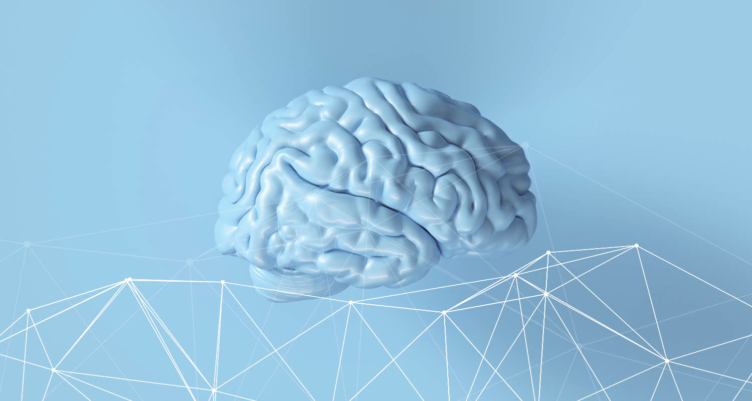
Executive function (how focused you are) and emotional awareness (how calm you are) play a major role in helping you perform at your best. You can rewire your brain with simple daily habits so that it automatically defaults to a calm, focused state. It takes about 66 days to make a new habit automatic — if you commit to that time, it can change your life dramatically. Endurance training, intermittent fasting, meditation, and smart supplementation work together to upgrade your brain on a biological level. You have a big deadline looming but you’ve been bingeing ‘90s sitcoms on Netflix for the last four hours. Or maybe you get totally overwhelmed by the slightest bit of emotional stress, even though rationally you know it’s not a big deal. This behavior happens to everyone, and it definitely isn’t weakness on your part — it comes down to how your brain is wired. Without training, your brain is reactive. It seeks comfort above all else and chases whatever is right in front of you. Getting your brain to do difficult things — working, staying calm, dealing with stress — takes effort, especially if you aren’t in the habit of controlling it. Fortunately, your brain is extraordinarily pliable, and with the right tools, you can rewire your brain pathways to respond better to challenging situations. Read on to learn how to reset your brain — at a biological level — for more focus and calm. Related: Get free guides, ebooks, recipes and more to supercharge your health Changing behaviors starts with the brain In a recent Bulletproof Radio podcast episode ( iTunes ), developmental molecular biologist John Medina discussed two of your brain’s functions that play a major role in helping you perform at your best: Executive function Executive dictates your ability to […]
All things in moderation, even gaming: Study shows one hour can improve visual attention, ability to focus

( Natural News ) Playing video games is not bad for you, as long as it is in moderation . In fact, one hour of gaming can enhance the ability of a person to focus , according to a study published in the journal Frontiers in Human Neuroscience . The study was carried out by a team of researchers from the University of Electronic Science and Technology of China and the University of Arkansas in the U.S. For the research, the authors looked at the effect an hour of gaming session had on brain activity and visual selective attention. Twenty-nine male subjects were observed. These participants were divided according to their video game expertise. Participants who had a minimum of two years of experience playing action video games and belonged to the top seven percent of League of Legends players were identified as experts; those who had less than six months of experience and ranked in the lowest 11 percent of players were identified as non-experts. The research team measured the participants’ visual selective attention before and after an hour of a gaming session. At the same time, the researchers observed brain activity linked to attention with the use of an electroencephalograpy (EEG). Visual selective attention is the ability of the brain to focus on relevant visual information while inhibiting less relevant information. Individuals with better visual selective attention are using their brains more efficiently. This means that they can focus more on relevant information and block out distractions. To do this, the researchers briefly presented a square in the center of a computer screen to each participant. Then, they showed another square in a different part of the screen. The participant then identified the position of the second square relative to the first. Get more news like this […]
GMO.news brings you the truth about GMOs, genetic engineering and more

( Natural News ) Genetically modified organisms, or GMOs, have been a hot button issue for many years now. More and more, consumers are turning to non-GMO, organic options; the entire organic industry has been expanding at a rapid pace for the last decade. As organic options, farmers’ markets and other GMO-free alternatives continue to skyrocket in popularity, it comes as no surprise that the conversation about GMO foods has become increasingly limited. Proponents of GMO foods are doing all that they can to hold onto their place in the market — and to keep suspicions about the safety of GMOs at bay. Last year, a Pew survey revealed that 39 percent of Americans thought GMOs were bad for your health. While its clear that shoppers are becoming more savvy and knowledgeable, that can be a dangerous thing for an industry that relies on deception for profits. The GMO propaganda machine is in full-swing; last year, a congressional bill was passed that would allow $3 million taxpayer dollars to be shelled out for “consumer outreach and education regarding agricultural biotechnology.” In other words, millions of tax dollars are being spent to brainwash the public into buying the GMO hype. Getting the truth on GMOs is a hard thing to do these days; shills are everywhere. Not only is reporting on GMOs often stricken with bias, tech giants like Facebook and Google are actively suppressing discussion on a wide variety of topics. Censorship is real, and it’s already here. Independence and freedom are under attack at virtually every level — but at GMO.news , you can still find real reporting on the latest science on GMOs, genetic engineering efforts and more. Support our mission and protect your health: Organic Seeds of Life combines Red Raspberry Seed Power, Black Cumin Seed […]
Radiation.news offers a wealth of knowledge on radiation research and exposure prevention

( Natural News ) Radiation is a major threat to human health, and in our ever-evolving digital world, it is becoming a bigger threat than ever before. When most people hear the word “radiation,” they think of nuclear disaster, whether it be a nuclear weapon detonation or a nuclear power facility run amok. Ionizing radiation of this kind is undoubtedly lethal, but it’s not the only kind of radiation we need to be concerned about. Non-ionizing radiation, and specifically, electromagnetic radiation (EMR) are a major threat — and many of the devices in or around your home are a source of it. How often do you see the risks of cell phones, tablets, Wi-Fi routers, smart meters and other gadgets publicized by the mainstream media? Or perhaps, more correctly, how often do you see the threat of these modern toys downplayed? Indeed, like everything else these days, industry interests seem to come before human health. While there is no doubt that the advent of things like smart phones and wireless internet have revolutionized society, the fact remains that these luxuries can come at a cost to health (in one way or another). While the mainstream media may be reluctant to report the truth, at Radiation.news , you can learn about a variety of sources of radiation (both ionizing and EMR), what the risks are, how to avoid or limit exposure, and other health-preserving tips. Cell phone radiation a growing threat Everyone loves their cell phones, but if you love your brain more, it may be time to put down the smartphone and pick up your landline. Multiple studies have indicated that cell phone use is linked to an increased risk of brain cancer. Most recently, a government study found that cell phones are becoming increasingly dangerous to human health […]
Brain Food 101: Best Foods for Concentration and Focus

Brain foods like eggs, avocado, almonds and blueberries are not only delicious, they’re what to eat for a fit mind! What you eat today can affect your brain now and later. Whether that’s a positive or negative impact is up to what you put on your plate — or in your glass. Video of the Day As with overall health, foods and beverages play a role in mental fitness, including memory, focus and concentration and mind sharpness. They may have a potential preventative role in the development of dementia, Alzheimer’s disease or other neurodegenerative brain disorders too. Who Should Eat Brain Foods? Everyone can benefit from a sharp mind. “Short term, the right foods can help you perform better at school or work; the wrong foods can lead to brain fog,” says Maggie Moon , M.S., RD, author of “ The MIND Diet .” Research backs it up. A breakfast study finds that a lower-glycemic morning meal may lead to better memory and attention span up to two hours later, adds Moon. Putting research deliciously into practice, Moon shares that her go-to “smart” breakfast is avocado toast with an egg on it. “Long term, a healthy diet can keep your brain running like it’s nearly a decade younger than what your driver’s license says, while a poor diet ages your mind much faster and increases the risk of developing dementia,” says Moon. She supports the evidence-based MIND diet, which is a blend of the Mediterranean and DASH diets and has been optimized for brain health. Keep in mind that your brain is fueled by carbs. So rather than cutting carbs, a wiser approach is to follow a plan with brain health-promoting foods, such as the MIND diet, which includes the “right” carbs. Even if you’re not following a specific […]
Key Takeaways From the “Foods and Herbs that Remove Toxins” Webinar

Learn which foods and herbs can eliminate toxins from your body. Health and wellness are really simple—improve nutrition and remove toxicity. You probably have taken the positive steps of not smoking or drinking alcohol, but there are still numerous environmental pollutants getting into the body and rendering our systems toxic. How can you get rid of toxins that are inevitable in modern day living? Stephanie Ray, ND, who is the CEO of BIORAY, the Natural Detox Company, joined us for this month’s webinar titled "Foods and Herbs that Remove Toxins" and shared her experience with beneficial herbs and vegetables in regard to detoxification. Her talk shows you how simple it is to reduce the toxin load in your body right now. Living in a Toxic World The problem is that we live in a toxic world. Heavy metals, chemicals, pesticides and mycotoxins are invading our atmosphere and making it difficult to breathe in true fresh air. "Ninety-two percent of the population lives in pollution," Ray shared. How exactly do these toxins get into our body? Heavy metals are found in the following everyday items: Food Drinking water Silver tooth fillings Pharmaceutical drugs Vaccinations Sunscreens and lotions Cleaning products Commercial laundry soap Bug repellent Lawn fertilizers But with the right tools, you can rid your body of such chemicals and enjoy the benefits of detoxification such as improved memory, more natural energy, improved digestion, deeper sleep and balanced moods. How do Toxins Impact Everyday Life? According to Ray, toxins contribute to a multitude of daily struggles. Pollutants in the body can make you feel overwhelmed, forgetful, irrationally angry, anxious, and unmotivated. Additionally, toxins can cause a bad night’s sleep, brain fog, difficulty concentrating, gut imbalances, low energy levels, food sensitivities, loss of vitality, menstrual symptoms and mood swings. "Environmental toxins […]
